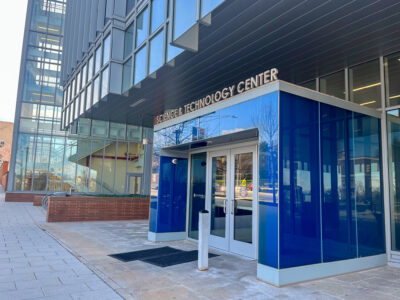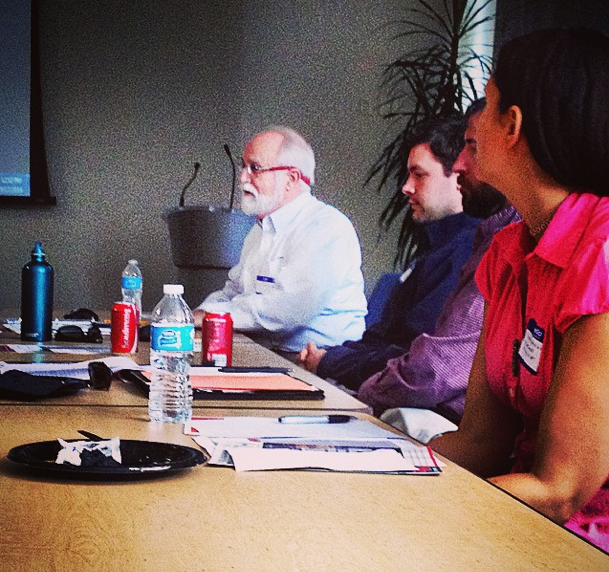To balance mission and sustainability, cultural institutions are still forging the norm of digital access to their archives. But they need to stop building their own and “get into the same sandbox,” said Edward Papenfuse, the recently-retired longtime chief of the Maryland State Archives.
“We live in a fragile, digital world,” he said. “We need a permanent, electronic archive for the care and perpetual maintenance of our cultural heritage.”
Papenfuse, who retired last fall after a celebrated 38 years in the role, is an outspoken and direct septuagenarian, with a bright white beard. He headlined a roundtable discussion Wednesday called “Connecting Cultural Institutions and Learners in the Digital Age.” It was organized by edtech startup Alchemy Learning as part of Baltimore Innovation Week’s Civic Day at the University of Maryland BioPark.
The event was also timed in part by the upcoming launch of Alchemy’s Baltimore Culture Crunch, an initiative pairing area cultural institutions with teachers that creates a portal of digital content for students. More on that to come, said Win Smith, a cofounder of the firm based in fast-changing Carroll-Camden. The three founders have a handful of part-timers working to build out their learning software.
Alchemy is nearing the first anniversary of the launch of its teacher tool for curriculum building and sharing. It’s in beta with a central distribution platform, where the team hopes cultural groups and others will share digital-learning resources.

Alchemy Learning cofounders Henry Blue (left) and Win Smith address attendees at their Baltimore Innovation Week event. (Photo by Christopher Wink)
Nearly a dozen regional cultural groups were represented in a BioPark auxiliary room looking out onto West Baltimore Street, including Jeannie Howe of the Greater Baltimore Cultural Alliance and team members from the Baltimore Museum of Art and the Walters Art Museum, in addition to several K-12 schools. All told, more than 20 joined in.
The discussion, which also included data trends from Smith’s cofounder Henry Blue and Boys’ Latin School librarian Merlin Hanson, was capped off by Papenfuse’s clear directive.
“There is no plan for the care and preservation for our rich cultural heritage,” he said, speaking of Maryland but remaining applicable to global needs. “We need a co-operable environment that every cultural institution should work together on in the cloud.”
In other words, communities need to come to expect a Wayback Machine for our cultural history — transcripts of old speeches, photos of important (and even every-day) figures, recordings and digitized artifacts — he said.
Who is the leader? The University of Georgia has garnered attention for its efforts to provide permanent digital archives, he said, kicked off years ago with a National Endowment for the Humanities grant. UGA is bringing together many institutions in one place.
It’s true that many cultural groups see their digital strategy, including gamification and archival access, as having a return on investment, but it’s still largely for in-person experiences. Nearly 40 percent of cultural groups expect increased “on-site patronage” because of that work, according to data from Alchemy.
That’s something Papenfuse understands.
“[Cultural groups] will make money by people who still want to walk through your halls and who will leave their money [as an endowment],” he said. “If you stay stuck on how much to charge or how to control your digital world, we’ll always stay behind.”
Join the conversation!
Find news, events, jobs and people who share your interests on Technical.ly's open community Slack

Baltimore daily roundup: Real estate deal in the Peninsula; Missing $100M nitrile glove factory; Dirt bike clampdown

Baltimore daily roundup: Gen AI's software dev skills; UpSurge Tech Ecosystem Report; MD service year program

Baltimore daily roundup: Mayoral candidates talk tech and biz; a guide to greentech vocabulary; a Dutch delegation's visit


